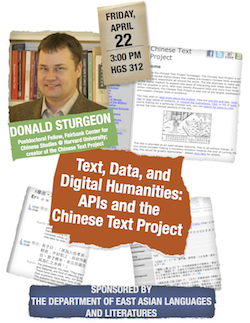Yale University, 22 April 2016
As databases, digital libraries, and digital tools grow in size and scope, they present increasingly valuable opportunities for research using novel methods including text mining, distant reading and other techniques that can be grouped under the heading “digital humanities”. At the same time, what can in practice be achieved technically using individual projects and their associated tools and materials is frequently limited by the types of use case envisioned by their creators when these resources were first designed and implemented.
Application Programming Interfaces (APIs) – standardized mechanisms through which independently developed pieces of computer software are able to share data and functionality in real time – provide one approach to greatly increasing the flexibility and thus utility of databases, digital libraries, and other tools. Key to the utility of such APIs is the possibility of functionality and content being reused in different ways by different users, without requiring central implementation of a new mechanism for each use case.
In this talk I describe how the implementation of existing third-party APIs as well as the development of a new special-purpose API for the Chinese Text Project, an online database and digital library of pre-modern Chinese texts, has opened up new opportunities for fast, efficient, and easy to use repurposing of data in a variety of contexts. These include user-driven integration with other online tools and resources (including both those already available, and those still to be constructed), statistical textual analysis and natural language processing research, and teaching and research in Chinese digital humanities.
